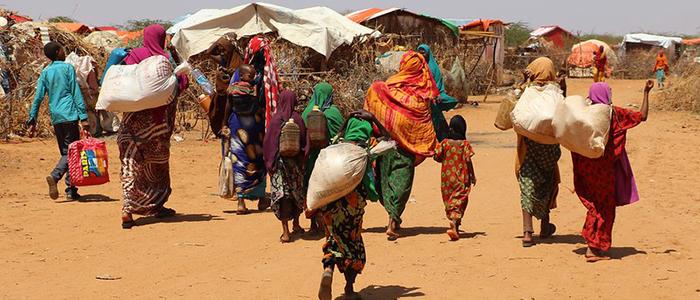
A devastating climate-induced drought is affecting the Horn of Africa. The situation is worsened by the impact of COVID-19, conflict and insecurity situation in the region, and the expected aggravation of food insecurity and nutrition due to Russia’s invasion of Ukraine. Therefore, the European Commission is reinforcing its political and financial commitment to partner countries in the region.
Today a total of €348 million in EU funding for 2022 to boost food security in the Horn of Africa was announced at a high-level roundtable co-hosted by the European Commission and the United Nations Office for the Coordination of Humanitarian Affairs in Geneva. Funding includes humanitarian assistance and longer-term support to tackle root causes of food insecurity, including climate adaptation and mitigation measures.
EU funding to support food security
- Humanitarian assistance: to respond to the overwhelming emergency needs in the region, the EU announced today an additional €32 million, bringing the total contribution to €108.2 million for the drought-affected countries in the Horn of Africa.
- To strengthen resilience and food security, the EU will make available €231 million over 2021-2022 out of €317.5 million set aside for the 3 countries in 2021-2024 from development funds. This support aims at strengthening State capacities to respond to the crisis and prevent further degradation.
- In addition to these funds, the EU's Foreign Policy Instrument (FPI) is making €8.9 million available for actions aimed at breaking the climate-conflict cycle in Somalia and sustainable conflict management in Arid Land Ecosystems in Kenya.
Commissioner for Crisis Management, Janez Lenarčič, said: “The humanitarian consequences of the historical drought affecting the Horn of Africa in countries like Somalia, Kenya and Ethiopia are dramatic. Millions of people are already affected by the drought and in need of life-saving assistance. In addition, the dependency on Ukrainian and Russian imports already adversely impacts food availability and affordability in this region. The time to act is now. The international community, humanitarian and development partners, national authorities and communities must save as many lives as possible and work together in a sustained effort to address the emergency and build future resilience.”
Commissioner for International Partnerships, Jutta Urpilainen, added: “With the Horn of Africa region facing the worst climate-induced droughts in recent history, the impact of economic shocks related to COVID 19 and of conflicts and insecurity, the food security of the region is at stake. With our partners and the international community, in a multilateral approach, we must fund structural policies addressing the underlying causes of food and nutrition crises and make vulnerable people more resilient to shocks. The best way we can work together is through the humanitarian, development, and peace nexus. The new EU Global Gateway strategy will contribute to this work.”
Background
Into the 3rd year of consecutive failed rainy seasons, the perspective of a new famine in Somalia is looming while food and nutrition insecurity continues to grow at a fast pace in Ethiopia and in the Arid and Semi-Arid lands of Kenya.
Moreover, the humanitarian situation in the Horn of Africa continues to worsen as forecasts for the first rainy season of 2022 predict, overall, below-average rainfall, making this drought the longest and the most severe in the last 40 years.
A robust multilateral response to global food security is needed now more than ever to address structural vulnerabilities, building on the momentum of the United Nations Food Systems Summit (UNFSS) and the Nutrition for Growth event in Tokyo.
The EU is committed to working with partners in the region and other international actors to support national pathways to sustainable food systems through structural policies and investments, addressing the humanitarian, development and peace dimensions.
The Global Gateway Africa – Europe Investment Package aims to mobilise up to €150 billion in investments between 2021 and 2027 for Africa to support a strong, inclusive, green and digital recovery and transformation. It will support the renewed partnership agreed at the EU-AU Summit on 17 and 18 February in Brussels.
Related pages
Details
- Publication date
- 26 April 2022
- Author
- Directorate-General for European Civil Protection and Humanitarian Aid Operations (ECHO)
